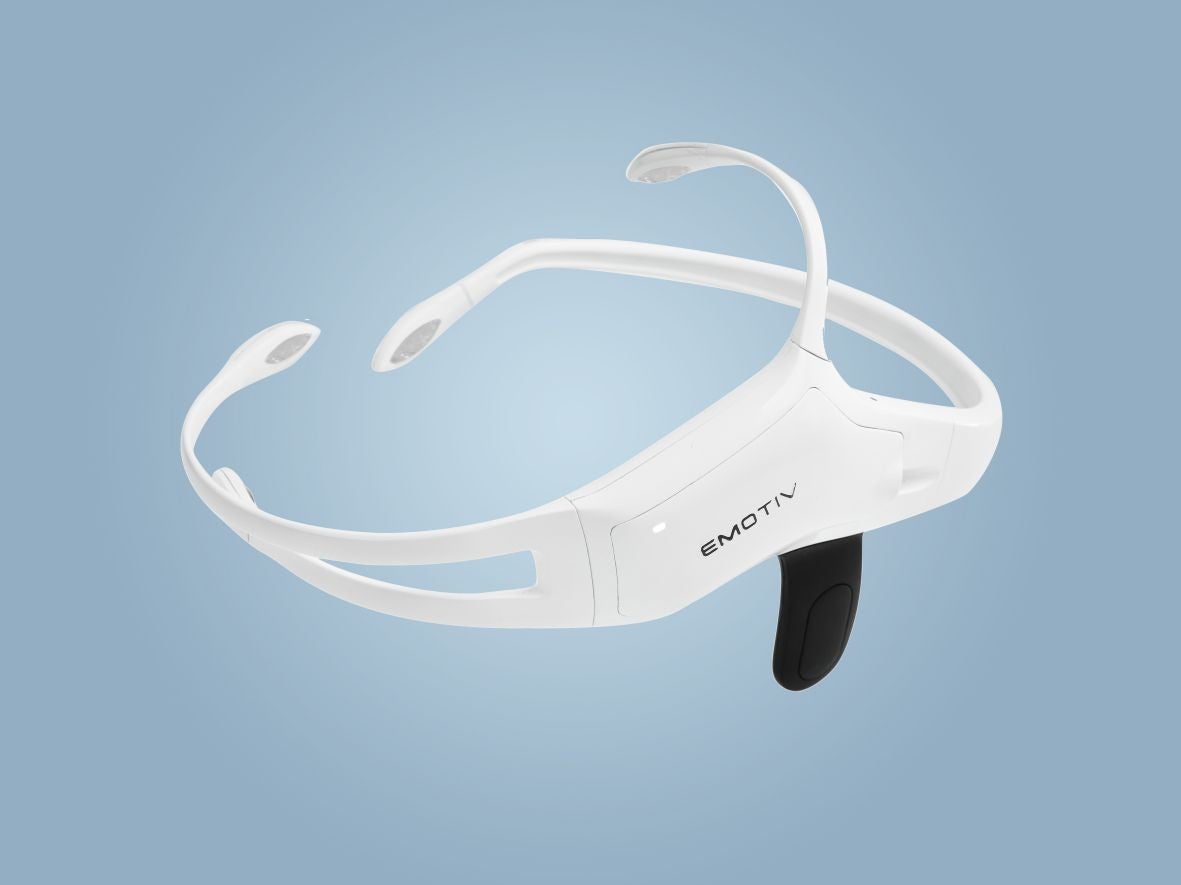Mind-reading headsets could revolutionise our interaction with the world
Brain tech is gaining high-profile backing - even Disney believes that it may soon become as covetable, and mainstream, as Fitbits and iPhones

Your support helps us to tell the story
From reproductive rights to climate change to Big Tech, The Independent is on the ground when the story is developing. Whether it's investigating the financials of Elon Musk's pro-Trump PAC or producing our latest documentary, 'The A Word', which shines a light on the American women fighting for reproductive rights, we know how important it is to parse out the facts from the messaging.
At such a critical moment in US history, we need reporters on the ground. Your donation allows us to keep sending journalists to speak to both sides of the story.
The Independent is trusted by Americans across the entire political spectrum. And unlike many other quality news outlets, we choose not to lock Americans out of our reporting and analysis with paywalls. We believe quality journalism should be available to everyone, paid for by those who can afford it.
Your support makes all the difference.Imagine a world where all your thoughts and feelings were being mapped. Where the pleasure and pain responses in your brain were noted. Where you could control objects using only your mind.
This is reality for Emotiv. The futuristic company sells wearable technology for the brain – portable, lightweight brain scanner headsets with sensors positioned around your scalp – from $300 (£200).
Each sensor measures electrical signals from the brain, working as an electroencephalogram (EEG), and transmits the data wirelessly to a user’s PC or mobile. Emotiv’s software analyses the patterns of activity to determine moods and emotions, facial expressions, mental performance – and to control objects with your mind.
After charging the lightweight headset, the battery lasts for 10 hours (with their newest model, Insight), or four hours (with their first model, EPOC). The Insight comes with an app that allows people to measure and monitor brain activity. Apps and games allow you to control virtual objects with your mind. And developers are working on lifestyle apps that address stress reduction, focus optimisation, and cognitive health and wellness.
While the Google Glass headset was all about interacting with the outside world, Emotiv’s products are as much about understanding the outside world’s impact on our minds as about controlling our surroundings.
Although the headsets are far from mainstream, they have big fans in high places – Disney believes that brain tech may soon become as covetable as Fitbits and iPhones. The corporation chose Emotiv as one of 10 start-ups to take part in its accelerator programme, receiving intensive help from the House of Mouse.
The bioinformatics company is working with Disney on a project measuring people’s emotions in real time when viewing adverts or films. One day, focus groups may not need to be asked what they feel when they watch; their brains will reveal the answers instead. Emotiv’s vice-president, Kim Du, believes that it will be useful for business: “Whether watching a show or commercial, how people respond to that – being able to understand that dynamically – is useful.”
But it’s the potential of the headsets to let people use their minds to control external factors that has caught the imagination of technology websites such as The Toggle. They predict that the technology might eventually mean that gamers could “completely control virtual realities and games with their own thoughts, creating an immersive and completely syncopated experience all rooted in the lobes of the human brain”.
Emotiv founder Tan Le were inspired by Star Wars. “It’s the magic of being able to control objects. They wanted to do that with their minds,” says Du, who was part of the founding team. “It set them off on an adventure.”
She says that Emotiv is “bringing brain scans out of the clinic and into people’s natural environment. Our wireless importable technology allows you to collect high-resolution data – all for less than the cost of a smartphone.”
The technology currently enables people to control physical objects – such as light switches – as well as virtual ones, with their mind, and to move remote-controlled items. It’s not quite hit the Roald Dahl peak of Matilda’s spoon-bending, but is far more useful than that for people with disabilities, with whom it’s already being used.
Emotiv uses machine-learning algorithms to allow users to train different patterns and initiate multiple brain-wave commands. “There have been proof-of-concept applications allowing users to control wheelchairs with their minds,” Du says. “Reconfiguring wheelchairs to take inputs from our technology allows users to reclaim mobility. We’re trying to improve people’s understanding of their brains and improve their quality of life.

“We recently worked on a proof-of-concept application for people suffering from Lou Gehrig’s disease – or amyotrophic lateral sclerosis – which in its advances stages sees people confined to bed and losing their ability to speak, making it hard for them to ask somebody to do something for them.”
Du does caution that the headsets are not meant to replace hospital-grade brain scans, which have more than 200 sensors to give a full reading of brain activity. By comparison, Emotiv’s Insight headset has 14 sensors. Its first headset, EPOC, has five sensors. “This has been validated and peer-reviewed, but if you are experiencing some kind of trauma it’s important to go to the hospital.”
The headgear has also been used for other projects, including work with National Geographic to look at the effects of nature on the brain. Our bodies and brains are calmer in natural environments. Surprisingly, simulations of nature create the same calm effects in our brains. Meanwhile, the Smirnoff MindTunes project allowed musicians with debilitating conditions to have access to technology which enables them to create a music track, later mixed by DJ Fresh.
When I ask Du about the role the brain tech plays in her life, she is – unsurprisingly – an enthusiast. She also finds it utterly normal: the idea of tracking her brain’s ability to focus on different tasks throughout the day is as natural to her as tracking her heart rate on a run. “Morning is best and after 2pm I don’t want to make most important decisions,” she says. “People can find their own optimal focused time, track their stress levels, do a guided meditation and see themselves go from stressed out to relaxed. Most people don’t get a brain scan unless they experience some kind of trauma: we want the ability to understand and learn about our cognitive health now, so we can take care of it. If we have a database of healthy brains, we can learn better how to study neurological conditions.”
Du believes it’s “far out, but not that far out” that we’ll be able to optimise the conditions around us to be more soothing and less stressful for the brain. “I’ll walk into my house, and the technology will know I’m tired, the music turns on to soothe me, the lights dim – I find that really exciting.”
For now, she thinks the time is right for Emotiv headwear. “People are becoming more accepting of technology and the benefit of learning about their own bodies. I can look at my watch and it will tell me if I haven’t taken enough steps and that I should take a walk. A few years ago it wasn’t even accessible – now we can live smarter lives with the use of technology.”
But, Du admits, even a portable brain scanner worn as headgear has its limitations. “There’s one thing the technology doesn’t do: it doesn’t improve mental performance,” she says.
Join our commenting forum
Join thought-provoking conversations, follow other Independent readers and see their replies
2Comments